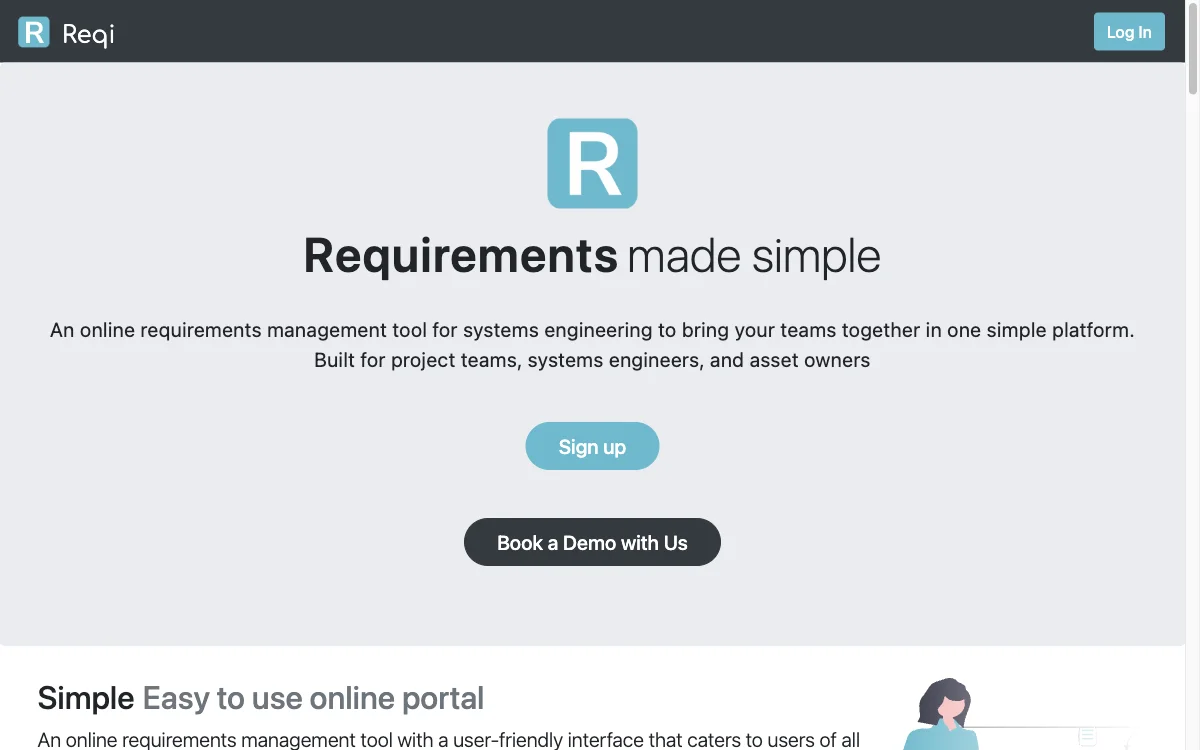Reqi stands out as a comprehensive online requirements management tool designed specifically for systems engineering. It brings project teams, systems engineers, and asset owners together on a single, user-friendly platform. With its intuitive interface, Reqi caters to users of all proficiency levels, offering visualizations and system-level views that make monitoring and tracking compliance straightforward. This ensures that all team members and supply chain partners are aligned, facilitating easy identification of areas for improvement.
At the heart of Reqi's functionality is its commitment to applying systems engineering principles from the ground up. It connects teams directly to contract requirements, enabling efficient management and visualization of system architectures, requirement allocation, and compliance. This approach ensures that requirements are closely tracked and managed throughout the project lifecycle, significantly reducing the risk of delays or unexpected issues.
Collaboration is another cornerstone of Reqi's design. It promotes a proactive approach to project management by aligning expectations and deepening understanding of project objectives from the outset. This is achieved through a shared, easy-to-use data environment that provides certainty of outcomes by ensuring alignment of expectations at the start. By establishing clear expectations and goals early on, teams can work together more effectively, minimizing the risk of delays or misunderstandings.
Reqi's end-to-end solution is built using systems engineering principles, aiming to drive efficiencies throughout the project delivery team and supply chain. It is designed to manage complex projects throughout their lifecycle phases, from conception to delivery. This comprehensive approach ensures that all aspects of the project are closely tracked and managed, further reducing the risk of delays or unexpected issues.
Introducing Rex AI, Reqi's AI-powered bot, marks a significant advancement in requirement management. Rex AI automates requirement generation from PDFs using advanced AI algorithms, allowing users to define requirements from briefs, specifications, and reports seamlessly. It facilitates collaboration, refines requirements, and keeps teams organized, transforming the requirement management process.
Reqi also features an AI-driven risk assessment tool that helps identify hidden risks and facilitates the implementation of mitigation measures. This, combined with the platform's ability to refine requirements and suggest improvements, provides valuable insights by analyzing data and identifying missing or conflicting requirements. With Rex, users can streamline their requirements management process, eliminating ambiguities and enhancing project outcomes.
Security is a top priority for Reqi, which is committed to delivering the most secure and compliant document review system on the market. The team continually monitors and patches threats to ensure users stay secure. Additionally, Reqi offers customizable solutions with its enterprise offering, providing full flexibility to tailor the platform to specific team needs. Full support is available with the enterprise solution, built on the best cloud solutions and networks in the market.
Reqi's capabilities extend to contract management, allowing for the bulk import of contract requirements and offering visualization tools to track compliance and provide system-level views across supply chains. It enables detailed analysis of relationship structures, critical for understanding how different parts of the system are interconnected. This makes systems engineering easy by showing potential risks and facilitating necessary changes.
Risk and traceability are managed through progressive reviews throughout the project lifecycle. Reqi tracks Assumptions, Constraints, and Dependencies, enabling Acceptance Criteria to be defined and tracked across multiple parties with aggregation and traceability throughout the supply chain. This allows teams to identify and mitigate potential risks early on, reducing the likelihood of delays or unexpected issues.
Reporting and dashboards in Reqi offer visualization tools for system architectures, requirement allocation, and packaging, allowing for monitoring and tracking compliance using system-level views across the supply chain. This enables systems engineers and teams to see the entire system and identify areas of potential risk or non-compliance, making it easy to make necessary changes.
Reqi is more than just a tool; it's a comprehensive solution designed to transform the way project teams manage requirements, ensuring efficiency, compliance, and collaboration throughout the project lifecycle.

